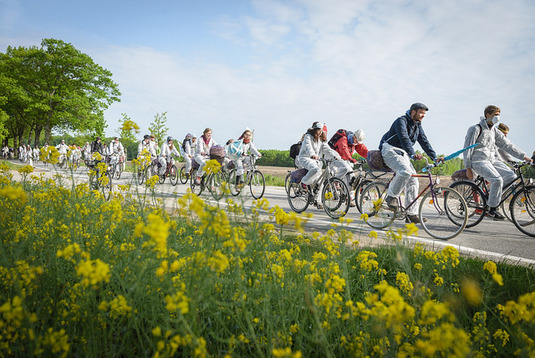Break Free 2016
“Ende Gelände” for the Fossil Fuel Industry
09.06.2016
Student reserach by Alexander Gorski.
Over the first two weeks of May this year, a global network of organizations and individuals from six continents united for the Break Free 2016 campaign, taking action against the continued extraction and burning of fossil fuels. From Brazil to South Africa, the UK to Indonesia, from Germany to the United States—over thirty thousand activists took on the industry directly responsible for the majority of the world’s greenhouse gas emissions, demanding they keep coal and other fossil fuels in the ground. Climate scientists maintain that such steps are necessary to keep global average temperatures from rising more than two degrees Celsius above those of preindustrial records—the de facto target of current global climate policy. If action is not taken, humanity will face consequences such as dangerous rises in sea level, massive droughts, a higher frequency of natural disasters and subsequent displacement, food and water scarcity, and the proliferation of violent conflicts over resources.

Activists at Ende Gelände cycling to a power plant to create a blockade. Photograph: Rikuti, Wikicommons, CC-BY-SA-4.0.
The climate activists employed a range of creative protest and demonstration tactics to express their outrage over the fossil fuel industry’s ongoing practice of putting profits above people. They also voiced their anger concerning governments who lack the political willpower to take determined steps to end the fossil fuel age and start the transition towards 100 percent renewable energy: in Newcastle (Australia) hundreds of “kayactivists” blocked one of the largest coal harbors in the world; in Nigeria people demanded a clean-up of the Niger delta; in Aliağa (Turkey) thousands demonstrated for an end to fossil fuel projects in their communities; all over Brazil people demanded an end to Fracking, and in Batangas City (Philippines) more than ten thousand people got together for a climate march.
In Germany nearly four thousand activists gathered in Proschim, Lusatia, for the Break Free event as part of Ende Gelände 2016, to take direct action against lignite mining in one of the biggest and most polluting open coal mines in Europe, owned by the Swedish state company Vattenfall. From 13 to 16 May 2016 several demonstrations were carried out, including sit-ins of the coal plant, its mine and its diggers. As a consequence, Vattenfall was unable to extract coal for the duration of the campaign and the power plant was reduced to a fifth of its usual capacity. Unlike at last year’s Ende Gelände 2015, this year the police presence was relatively low-key and demonstrators were treated with reserve. Only when several hundred activists entered the power plant did the police intervene to arrest over a hundred individuals, of whom all but one have since been released. The action caused waves in national and international media outlets, and shows that the climate movement is increasingly ready to tackle those corporations directly responsible for greenhouse gas emissions.
Taken together, these actions demonstrate the existence of a growing global social movement composed of individuals from varied political, religious, and cultural backgrounds who are no longer willing to stand by and watch corporate greed and political apathy steer the planet towards a hostile future.
In Germany, the next gathering of climate and degrowth activists will take place at the Klimacamp im Rheinland (19–29 August 2016).
Alexander Gorski's article has also been published on Seeing the Woods.

